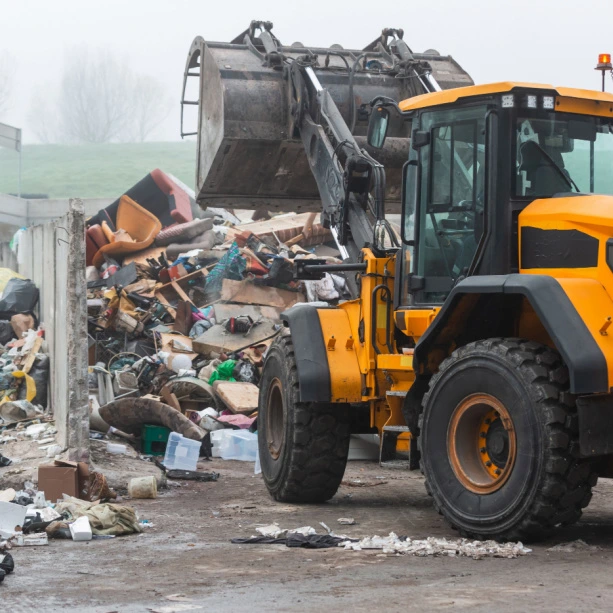Waste management is a critical issue that affects our environment and communities. The improper handling of waste can lead to pollution, health hazards, and ecological damage. It is essential to identify and address the biggest problems associated with waste management in order to ensure a sustainable future.
Increase Your ROI by Investing in AirFinder Everywhere
- Loss Prevention. Reduce the amount of loss that occurs during the supply chain process
- Location Coverage. AirFinder Everywhere uses a combination of GPS, Cellular, and WiFi to determine location everywhere
- Security Alerts. Know when a delay in shipment has occurred so the problem can be addressed immediately.
Waste Management Problems
-
Meeting Compliance Regulations
The Problem: Waste management companies must navigate complex and ever-changing regulations related to waste disposal, recycling, and environmental protection. Staying compliant with these regulations can be challenging and requires ongoing monitoring and adaptation. This can be difficult to do if it’s not part of your existing operational routine. Without deliberate mindfulness, these requirements can be easily overlooked, risking high compliance costs.
The Solution: A waste management system has proven helpful in this area. Automation is a great way to complete a task you don’t have time to do right manually, but where leaving pieces overlooked is not an option. Waste tracking is a great way to promptly ensure the proper disposal of waste and continue normal operations. This way, if there is an issue leading to compliance concerns, it can be addressed immediately. The data that waste management software provides can also be easily accessed and shared with regulatory bodies, simplifying audits and inspections.
Asset tracking also helps to identify potential safety risks in real time. For example, if a waste container is damaged or compromised, the waste tracking system can immediately notify the relevant personnel, who can take appropriate actions to mitigate the risk. This proactive approach to safety enhances the overall well-being of waste management workers, residents, and the environment.
- Rising Operational Costs
The Problem: Waste management companies are facing rising operational costs, including expenses related to waste collection, transportation, and treatment. The main factors influencing these high costs are fuel prices, labor costs, and maintenance expenses.
The Solution: Logistics waste management helps companies reduce operational costs through the visibility they provide. The visibility of garbage trucks allows managers to make adjustments to routes. This in turn leads to reduced fuel consumption, lower emissions, and overall improved efficiency in waste collection and transportation processes.
By analyzing operational data, organizations can also optimize asset allocation, ensure optimal utilization, and identify underutilized or surplus assets. This information helps companies to make informed decisions regarding asset acquisition, deployment, and retirement, leading to cost savings and improved resource management.
- Contamination of Recyclables
The Problem: Contamination of recyclable materials is a persistent issue in waste management. When non-recyclable items are mixed with recyclables, it reduces the quality and marketability of the recycled materials, making it challenging to achieve high recycling rates.
The Solution: A waste monitoring system is a great way to reduce contamination of recyclable materials. Taking monitoring measures at recycling facilities can help reduce contamination and improve the quality of recyclable materials.
- Inaccurate Data and Reporting
The Problem: Relying on manual data collection leaves room for human error. This error can come from forgetfulness, someone rushing the task, or simple laziness. Regardless of the reason for error, this occurrence greatly plagues waste management companies. With inaccurate data, they are unable to make effective, data-informed decisions since their data records are incomplete.
The Solution: Waste management companies should invest in asset tracking to overcome this problem. Asset tracking solutions provide real-time operational data on waste generation patterns, collection frequencies, disposal trends, and more. And since no human is involved, the potential for human error is effectively removed from the data collection process. Analyzing this data empowers waste management companies to make informed decisions, optimize processes, and enhance overall operational efficiency. Data analytics software for waste management can further aid waste management companies in making the best decisions possible.
- Inefficient Collection Systems
The Problem: Inefficient waste collection systems can result in inadequate waste removal and contribute to waste accumulation in communities. Common issues that indicate an inefficient system include improper scheduling, inadequate bin placements, and limited collection services.
The Solution: Waste management companies should utilize advanced technologies, such as waste tracking systems for collection vehicles, which can optimize collection routes and improve efficiency. Waste tracking software helps to monitor the usage and condition of waste management assets such as containers, bins, and compactors. Companies can then plan and optimize routes based on factors such as proximity to waste generation sources, traffic conditions, and fill levels of individual containers. This information allows organizations to optimize asset allocation, schedule maintenance proactively, and reduce downtime for a more efficient system.
How to Overcome the Biggest Problems with Waste Management
Now that we have identified the biggest problems with waste management, let's explore effective strategies and solutions to overcome them:
Strengthening Waste Management Policies
To tackle the challenges associated with waste management, governments and regulatory bodies can strengthen waste management policies and regulations. This includes setting targets for waste diversion, implementing extended producer responsibility programs, and enforcing strict penalties for non-compliance. With the establishment of a conducive legal framework, people will be more motivated to properly dispose of waste.
Investing in Waste Infrastructure
Waste infrastructure is essential for companies to develop effective waste management. Resources should be allocated for building and maintaining recycling plants, composting facilities, and waste-to-energy plants. This provides communities with more sustainable options for waste disposal and recycling by providing the necessary infrastructure.
Promoting Circular Economy Principles
Embracing the principles of a circular economy leads to efficient waste management. The circular economy aims to minimize waste generation by promoting the reuse, repair, and recycling of materials. Governments, businesses, and individuals should prioritize the use of recyclable materials, support product take-back programs, and encourage the development of eco-friendly packaging solutions.
Implementing Advanced Waste Collection Systems
Advanced waste collection systems can greatly enhance waste management efficiency. Utilizing technology, such as asset tracking, optimizes waste collection routes and ensures timely pick-ups. Waste management companies should invest in waste management software to improve collection processes and reduce waste accumulation.
Fostering Collaboration and Partnerships
Collaboration between various stakeholders is crucial for effective waste management. Governments, local authorities, waste management companies, businesses, and the public should all work together to develop and implement waste reduction strategies. These direct partnerships can foster knowledge sharing, resource optimization, and the creation of innovative solutions. Assigning one person to manage waste might work on a small scale, but as growth occurs, you need others on your team to help you. Within waste management companies, designating one group to lead operations can provide further direction and delegation ensures one group isn’t overwhelmed with responsibilities.
Encouraging Public Participation
Promoting the public’s cooperation in waste management initiatives is vital for their success. Communities should be encouraged to participate in recycling programs, composting initiatives, and waste reduction campaigns. Offering incentives such as tax credits or discounts for eco-friendly practices can motivate individuals to actively participate in waste management efforts.
The Future of Waste Management
As waste generation continues to rise, the need for sustainable waste management practices becomes increasingly urgent. Asset tracking, combined with its data analytics feature, is transforming waste management into a more streamlined and environmentally friendly process.
In addition to optimizing waste collection and disposal, asset tracking can facilitate the implementation of recycling, upcycling, and waste-to-energy initiatives. By integrating asset tracking into waste management systems, we can achieve significant advancements in waste reduction, resource recovery, and overall sustainability.
Are You Prepared For These Waste Management Problems?
Being prepared for these problems is the first step to overcoming them, and implementing waste management tracking is a great way to prepare. Waste management solutions have helped waste managers meet compliance regulations, reduce operational costs, and much more. All these improvements have allowed companies to be more sustainable and increase efficiency.
Our AirFinder Everywhere solution can be used to help waste management companies overcome and prepare for their waste management problems. AirFinder tracks the location of assets in real-time anywhere they are, which can provide visibility of your garbage trucks and other waste management assets so you can make improvements to your operations and ensure sustainability. Book a demo with our team to learn how our solution can help you improve your waste management strategies.




